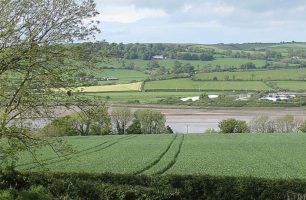

Environment
Possilbe Multi-million Pound Market For Green Farming After Brexit
A new report published today from Green Alliance and the National Trust [1] state that farmers may benefit from a new scheme that aims to give millions of pounds towards farming methods that provide clean water, restore wildlife and reduce flooding.
Green Alliance and the National Trust have proposed a new model for green farming, which it is hoped will create new markets for sustainable land management. Under the scheme groups of farmers working together would sell flood protection and clean water to water companies and public authorities downstream.
Called Natural Infrastructure Schemes, the new model could see savings for organisations currently facing high costs from poor water quality and flooding.
Green Alliance calculates the cost of river flooding and water contamination to water companies, local authorities, public agencies and infrastructure operators at just under £2.4 billion a year. Contracting to avoid just a quarter of these costs could release as much as £120 million for each of England’s 100 catchments over a 20-year catchment scale scheme [2].
Sue Armstrong-Brown, policy director at Green Alliance, said: “The old CAP subsidy-and-grant approach is inadequate to deal with the pressures on land and the realities of farm economics. The potential market for environmentally-beneficial farming could be worth millions – far more than the £400million available to farmers through government agri-environment schemes. We need to make farming part of the way the environment is returned to health, and that means making good environmental management pay.”
Green Alliance and the National Trust will be working alongside leading landowners and businesses over the next 12 months, preparing to introduce pilot Natural Infrastructure Schemes in the UK.
Today’s report follows the National Trust’s call in August that restoring the natural environment should be at the centre of any replacement to the Common Agricultural Policy [3]. The conservation charity believes a focus on protecting and enhancing the ‘natural assets’ on which food production depends will open farming to new environmental markets that make it profitable and rewarding to manage land sustainably.
Patrick Begg, rural enterprises director at National Trust, said:
Farmers should be paid fairly for producing great food in a way that supports the long term health of our farmland.
“The Natural Infrastructure scheme is about creating a market for services from farming that today go unrewarded – reducing flood risks, improving water quality and creating homes for wildlife, while at the same time opening up new revenue opportunities for farmers.”
Welcoming the report, Christopher Price, director of policy at CLA, said: “Every day, alongside agricultural production farmers and landowners deliver valuable environmental services such as reducing flood risk and helping tackle climate change. If we can connect, via markets and incentives, those who benefit with the land managers who do the work then there is a real opportunity to grow this type of work and to amplify the benefits it delivers. We welcome this useful contribution to the important natural capital discussion and we look forward to working with Green Alliance, the National Trust and other groups to explore opportunities for further investment in environmental services.”
Angela Francis, senior economist at Green Alliance, said: “In many places natural filtration and flood risk management are already cheaper than hard engineering. Once you have a good that can be supplied for a price that a buyer wants to pay, you have a market. Natural Infrastructure Schemes put these factors together and provide an opportunity for us to start restoring nature now.”
The Natural Infrastructure Scheme could benefit upland farmers who are struggling to make ends meet.
Chris Clark, who farms at Nethergill Farm in the Yorkshire Dales, said: “As we prepare to leave the CAP, diversifying how we make money from our land makes good business sense. Setting up marketing groups for our green services would offer a great deal for farmers and for our customers. The appetite exists for doing things differently, if we can make it pay.”
The report will be launched this morning at the Royal Society in central London. Representatives from business, local government and the third sector will debate how natural markets can benefit businesses and the environment [4].
Speaking at the event will be David Elliott, group strategy and new markets director at Wessex Water.
Ahead of the event, David Elliott said: “Water companies understand the value of resilient catchments for our business and our customers. We are already exploring long-term partnerships with our upstream farmers. Building markets for natural infrastructure would be a significant step towards bringing these approaches into the mainstream.”


 Environment12 months ago
Environment12 months agoAre Polymer Banknotes: an Eco-Friendly Trend or a Groundswell?

 Features11 months ago
Features11 months agoEco-Friendly Cryptocurrencies: Sustainable Investment Choices

 Features12 months ago
Features12 months agoEco-Friendly Crypto Traders Must Find the Right Exchange

 Energy11 months ago
Energy11 months agoThe Growing Role of Solar Panels in Ireland’s Energy Future


























